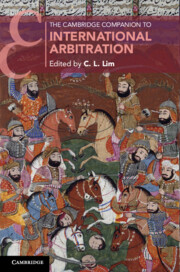Book contents
- The Cambridge Companion to International Arbitration
- Cambridge Companions to Law
- The Cambridge Companion to International Arbitration
- Copyright page
- Dedication
- Contents
- Contributors
- Foreword
- Preface
- Treaties, National Legislation, Cases and Awards
- Part I The History, Doctrines and Sociology of the Growth of Transnational Justice
- Part II International Commercial Arbitration as a Transnational Justice System
- Part III Investor-State Arbitration
- Part IV Inter-State Arbitration and the Pursuit of Peace
- Part V Systemic, Trans-Substantive and New Issues
- 17 Regulating Arbitrators and Rules on Professional Responsibility
- 18 Dealing with Corruption
- 19 The ‘Problem’ of Costs in Arbitration
- 20 Regression, a Conclusion
- Index
18 - Dealing with Corruption
from Part V - Systemic, Trans-Substantive and New Issues
Published online by Cambridge University Press: 08 October 2021
- The Cambridge Companion to International Arbitration
- Cambridge Companions to Law
- The Cambridge Companion to International Arbitration
- Copyright page
- Dedication
- Contents
- Contributors
- Foreword
- Preface
- Treaties, National Legislation, Cases and Awards
- Part I The History, Doctrines and Sociology of the Growth of Transnational Justice
- Part II International Commercial Arbitration as a Transnational Justice System
- Part III Investor-State Arbitration
- Part IV Inter-State Arbitration and the Pursuit of Peace
- Part V Systemic, Trans-Substantive and New Issues
- 17 Regulating Arbitrators and Rules on Professional Responsibility
- 18 Dealing with Corruption
- 19 The ‘Problem’ of Costs in Arbitration
- 20 Regression, a Conclusion
- Index
Summary
The issue of corruption is exemplary for the role of public policy in arbitration. Corruption is a “bilateral” criminal act involving the briber and the taker of the bribe, with varying nuances of solicitation on both sides.1 Both sides have an interest in keeping corrupt activities secret. Yet, regardless of the intentions of the parties, there is a universal consensus that corruption cannot be tolerated in international business relations. When international business transactions tainted by corruption are submitted to international arbitration, the notion of party autonomy finds its limits in the transnational public policy against bribery and corruption. No award can be allowed to take effect if it is seen to condone corruption. International arbitration derives its legitimacy from applying the law, including public policy rules prohibiting corruption.
- Type
- Chapter
- Information
- The Cambridge Companion to International Arbitration , pp. 410 - 437Publisher: Cambridge University PressPrint publication year: 2021
- 1
- Cited by



